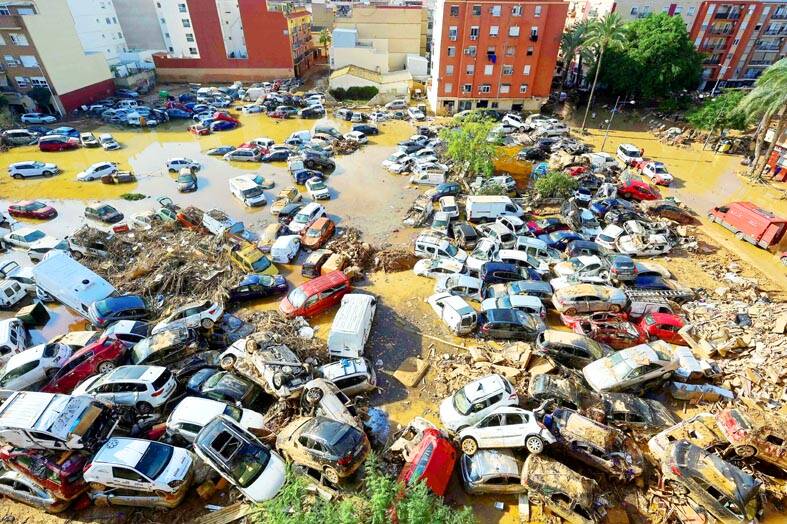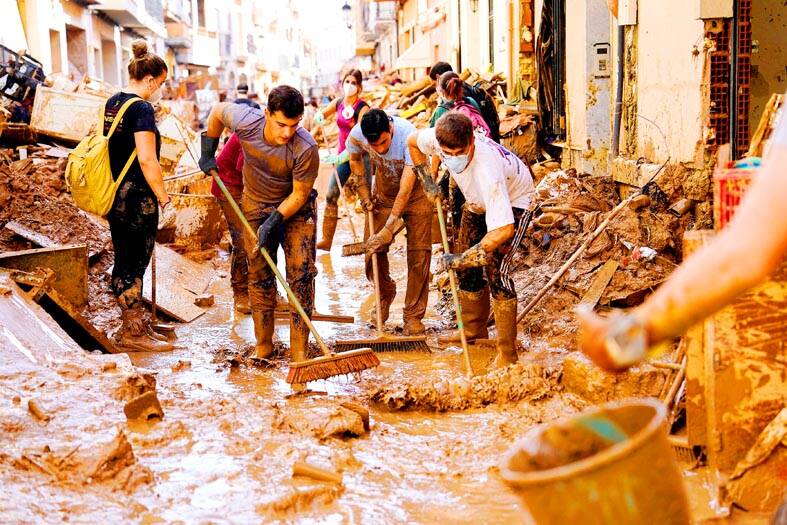People in the EU are being advised to stockpile enough food, water and essentials for 72 hours as part of a European strategy that aims to increase readiness for catastrophic floods and fires, pandemics and military attacks.
Outlining its first preparedness strategy, the European Commission said it wanted to encourage citizens to take “proactive measures to prepare for crises, such as developing household emergency plans and stockpiling essential supplies.”
The strategy was partly inspired by plans in Germany and the Nordic countries, which have distributed public information pamphlets and devised apps advising people what to do in the event of a military attack or other national crisis.

Photo: AFP
“We are saying to member states: 72 hours of self-sufficiency is what we recommend,” European Commissioner for Equality, Preparedness and Crisis Management Hadja Lahbib told reporters.
Asked about what citizens should stockpile, she referred to a video on her social media, in which she presents an emergency bag.
To a soundtrack of off-key jazz piano, Lahbib is shown on the video discussing her emergency stockpile in a tongue-in-cheek way, including ID documents in waterproof casing, canned food, bottled water, matches, a Swiss army knife, cash, playing cards, medicines and a small radio.

Photo: Reuters
The strategy was devised to ensure better EU coordination and public awareness in response to a range of potential risks, such as extreme weather exacerbated by the climate crisis, pandemics, cyber-attacks and military invasions.
“We must prepare for large-scale, cross-sectoral incidents and crises, including the possibility of armed aggression, affecting one or more member states,” the document said.
The commission is also calling for a Europe-wide preparedness day to raise awareness; for the topic to be put on school curriculums; and for an EU “stockpiling strategy” to ensure adequate supplies of raw materials, shelters, generators, and “potentially” food and water.
While the EU has no powers over civilian or military uniformed services, it has carved out a bigger role in crisis response since the COVID-19 pandemic led to the unprecedented common purchases of vaccines and medical equipment.
Now it wants to go further after a report from former Finnish president Sauli Niinisto last year found that there was no “clear plan” on what the EU would do “in the event of armed aggression against a member state.”
Niinisto, a special adviser to the European Commission President Ursula von der Leyen, said the EU was better prepared to deal with crises and disasters than five years ago, but needed a change of mindset and more planning to anticipate crises.
The plans are likely to provoke a mixed response from EU member states, who perceive threats in different ways. Last week, the European Commission rebranded its military spending plans “Readiness 2030,” instead of “Rearm Europe,” after complaints from the leaders of Italy and Spain, who said the language risked alienating people.
In contrast, northern European countries have led the way in emergency planning. Swedish authorities recommend keeping at home a good supply of water, energy-rich food, blankets and alternative heating, as well as investing in a battery-powered radio.
Norway advises people to stock up on nonessential medicines, including iodine tablets in the case of a nuclear incident.
German households have been urged to adapt their own cellars, garages or storerooms for use as bunkers, while housebuilders would be legally obliged to include safe shelters in new homes — as Poland has already done.
Responding to accusations of scaremongering, European Commission Executive Vice President for Social Rights and Skills, Quality Jobs and Preparedness Roxana Minzatu said the dividend of peace had given people a sense “it’s not going to happen to us,” despite seeing disastrous wildfires in Greece and floods in Spain.
The Belgian commissioner said that in Finland young people were taught how to handle a weapon, “but I don’t think that’s the kind of thing you’d have here in Belgium or France, not immediately, at any rate. It differs from one country to another, but we can learn from each other.”
The strategy was published the day after the Danish Ministry of Defense announced it was bringing forward plans to introduce military service for women by two years.
Women who turn 18 after July 1 could be required to take part in an annual ballot from next year to determine if they must perform mandatory military service, something which is already required of men.

In the sweltering streets of Jakarta, buskers carry towering, hollow puppets and pass around a bucket for donations. Now, they fear becoming outlaws. City authorities said they would crack down on use of the sacred ondel-ondel puppets, which can stand as tall as a truck, and they are drafting legislation to remove what they view as a street nuisance. Performances featuring the puppets — originally used by Jakarta’s Betawi people to ward off evil spirits — would be allowed only at set events. The ban could leave many ondel-ondel buskers in Jakarta jobless. “I am confused and anxious. I fear getting raided or even

Kemal Ozdemir looked up at the bare peaks of Mount Cilo in Turkey’s Kurdish majority southeast. “There were glaciers 10 years ago,” he recalled under a cloudless sky. A mountain guide for 15 years, Ozdemir then turned toward the torrent carrying dozens of blocks of ice below a slope covered with grass and rocks — a sign of glacier loss being exacerbated by global warming. “You can see that there are quite a few pieces of glacier in the water right now ... the reason why the waterfalls flow lushly actually shows us how fast the ice is melting,” he said.

Eleven people, including a former minister, were arrested in Serbia on Friday over a train station disaster in which 16 people died. The concrete canopy of the newly renovated station in the northern city of Novi Sad collapsed on Nov. 1, 2024 in a disaster widely blamed on corruption and poor oversight. It sparked a wave of student-led protests and led to the resignation of then-Serbian prime minister Milos Vucevic and the fall of his government. The public prosecutor’s office in Novi Sad opened an investigation into the accident and deaths. In February, the public prosecutor’s office for organized crime opened another probe into

RISING RACISM: A Japanese group called on China to assure safety in the country, while the Chinese embassy in Tokyo urged action against a ‘surge in xenophobia’ A Japanese woman living in China was attacked and injured by a man in a subway station in Suzhou, China, Japanese media said, hours after two Chinese men were seriously injured in violence in Tokyo. The attacks on Thursday raised concern about xenophobic sentiment in China and Japan that have been blamed for assaults in both countries. It was the third attack involving Japanese living in China since last year. In the two previous cases in China, Chinese authorities have insisted they were isolated incidents. Japanese broadcaster NHK did not identify the woman injured in Suzhou by name, but, citing the Japanese